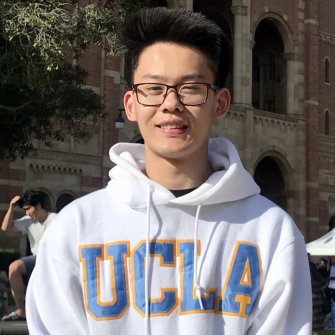
James Gao
Undergraduate student
22-year-old James Gao is a fifth-year student of Advanced Mathematics (Applied) and Actuarial Studies.
He is also the 2020 President of the vibrant UNSW Mathematics Society (MathSoc), which boasts one of the largest memberships of a student society university-wide.
James gives us a preview of MathSoc's plans to help students stay connected over the coming period, shares his own tips for staying happy and healthy in these uncertain times, explains his passion for maths and reveals his dream job!
How did you get involved in MathSoc?
I, perhaps after one too many movies, developed quite an idealised version of the university experience and university life, and spent the first and second years of university trying to get involved in order to make the most of my limited time at UNSW. That’s how I found myself as a subcommittee member in MathSoc, and since then, the incredible people and rewarding work has kept me going from directorship through to my current exec position.
I still firmly believe that one of the most valuable things that university provides is the opportunity to meet new people, make friends and improve yourself, so make the best use of it!
You’re heading up MathSoc in unprecedented times: Students are off campus and undertaking their classes online for the foreseeable future. Can you tell us some of MathSoc’s plans to keep your members connected during the coming weeks/months?
MathSoc’s plan of attack is two pronged. Firstly, physical isolation restrictions mean that opportunities for accessible community involvement are critical. In the coming months, MathSoc is planning to provide regular opportunities for involvement through virtual events, like: chess, Tetris, and Skribbl.io competitions; technical workshops; and publishing interactive content.
Furthermore, we will be cultivating our Discord channel where members will have the opportunity to freely socialise.
Secondly, we think it is important to reduce academic stress and uncertainty as much as possible, through continuing our long-held commitment to providing academic support to our constituents. We are planning to continue publishing solutions; holding pre-final revision seminars for various first and second year math courses; and even hosting our own mock exam in the coming weeks/terms.
Ultimately, MathSoc’s foremost vision and goal for this year is to increase community engagement and enhance student life, something that is even more crucial in trying times like this. If you have any suggestions, please feel free to contact us any time.
Do you have any tips for students for keeping healthy, sane and engaged with others during these uncertain times?
I think maintaining fulfilment and engagement stems from doing things you enjoy with the people you enjoy - together, whatever it might be. Perhaps that is easier said than done, but for me, some of the best times of my life - much to the chagrin of my parents - have been spent on endless hours of video games with my friends… something I plan to do in large quantities in the near future.
I think it is also important to realise that your future is long and vast, it is ok and important to spend some time for yourself, not worry too much, and take a break for as long as you need!
Do you have any new hobbies that you plan to take up over the coming period? Or any existing ones that you’re planning to master?
I’ve always wanted to learn Python, due to its practicality and versatility, but never really got around to it due to various excuses. Now that we are all learning from home due to COVID-19, I am challenging myself to reallocate the daily three hours of commute to and from UNSW into learning Python.
Why maths? What keeps you interested in it?
I am very competitive, and fundamentally, the prospect of challenging myself and solving mathematical problems is deeply rewarding to me. However, as I increasingly get exposed to the incredible breadth and depth of mathematics as a discipline, I have also come to deeply realise the beauty of mathematics and love the process of exploration and learning, discussing challenging concepts and solving complex problems with my peers.
This is perhaps a bit weird, but too often I have caught myself giggling as I scroll through page after page of my professor’s publications, understanding absolutely nothing, but feeling deeply awed and motivated. The vastness and complexity of mathematics is truly humbling and inspiring.
What has been your favourite course at uni so far?
I deeply enjoyed MATH6781 Biomathematics - which provided an introduction to mathematical modelling and data analysis for biological and biomedical systems. It stood out in particular due to its focus on analysing and modelling real-world phenomena, like: growth of tumours, population dynamics, cell signalling, etc.
I found it rare that we got to relate each theoretical facet so tightly with the physical world as we did within the course, which has thus allowed me a much greater appreciation of the course material and the functionality and beauty of mathematics in general.
What’s your dream job?
My dream job is to design and build spaceships. Ever since I was a child, I’ve always been fascinated by space and I firmly believe that interstellar exploration is the future of science and our civilisation. One of the biggest reasons why I initially pursued mathematics as a degree stems from my desire to establish a foundation to eventually pursue such a career and my, perhaps silly, dream is to contribute to humanity’s advancement of space exploration, no matter how little.
Who should I interview next?
I would love to read and learn more about you or the other staff that I get to interact with at the School of Mathematics and Statistics.
-------------------
April 2020
Interview conducted by Susannah Waters
